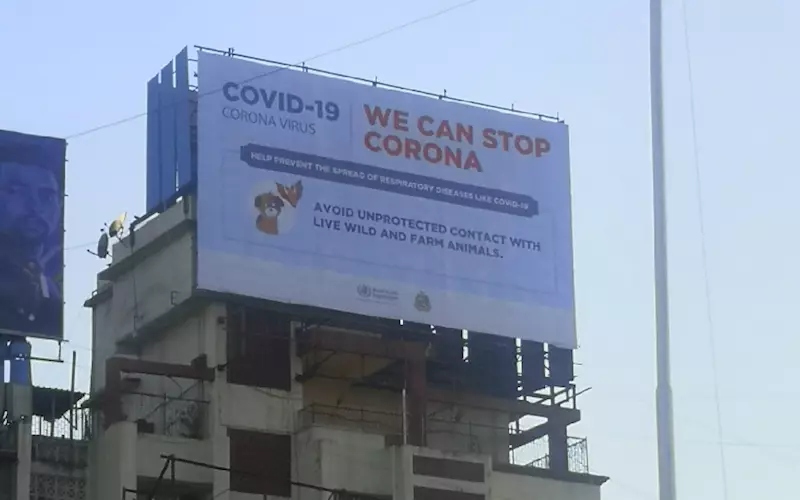BMC asks 1,200 hoarding owners to display Covid-19 messages
As the war against coronavirus intensifies, the Brihanmumbai Municipal Corporation (BMC) has asked all licensed hoarding owners in Mumbai to display coronavirus messages till 25 March, starting from 16 March 2020.
17 Mar 2020 | By Aultrin Vijay
Following the outbreak of novel coronavirus disease, a directive was issued by BMC commissioner Praveen Pardeshi under the Disaster Management Act, 2005 and Epidemic Diseases Act, 1897. It warned that those disobeying the directive will have their hoarding licences cancelled. Mumbai has approximately 1,200 licensed hoardings at various places with high footfalls and traffic signals.
The civic body officials have already started sending out letters to hoarding owners informing the new directive. The letter stated, "Covid-19 has been declared a pandemic by the World Health Organisation. Against this backdrop, it is need of the hour that an intense awareness campaign be undertaken to minimise the spread of coronavirus."
It also mentioned that messages on such hoardings will strengthen efforts of the BMC and the state government to fight the outbreak. As on Monday, there are 37 Covid-19 patients in Maharashtra.
As an incentive for advertisers who are expected to print the flexes at their own cost, those displaying the awareness messages will be given a rebate in licence fees for the display period. However, if hoarding owners fail to display the awareness messages during the 10-day period, the civic officials would be cancelling their licenses along with removing the present display and the hoarding structure.
Meanwhile, Advertising Standards Council of India (ASCI) is clamping down on unscientific anti-coronavirus claims by several product categories such as mattresses, disinfectants, sanitizers and food.
ASCI secretary general Shweta Purandare said, “ASCI is looking into all complaints being flagged by consumers pertaining to potentially misleading claims. In exceptional circumstances, when it appears that an advertisement is in serious breach of the ASCI Code and has the effect of causing public harm, then the ASCI would direct the advertiser to suspend the ad.”
ASCI will ask the advertisers to suspend advertisements with false claims immediately.
Note from BMC chief Praveen Pardeshi
In an effort to reach out to masses and spread awareness about the Covid-19 situation in Mumbai, the municipal commissioner took to Instagram in an interview with social media handle Humans of Bombay. Excerpts from the post:
1. The state government has declared COVID-19 as an epidemic. All measures under the Epidemic Act are in effect.
2. Social-distancing is key to containing the outbreak. A lock-down has been initiated by the closure of schools, colleges, theatres, malls, pools and gyms.
3. Although colleges and schools have been closed for daily lectures, scheduled exams will proceed. Schools are instructed to send back students who show symptoms like dry cough, runny nose and breathlessness. Students may also be excused from attending the exam, provided they submit a medical certificate that states they have a cold, cough or fever.
4. We highly advise companies to initiate work-from-home policies wherever possible. If necessary, we will make this mandatory in the days to come.
5. Testing capacity is up to 200 tests a day, but we are actively pushing for an increase by seeking permission from hospitals to set-up testing centres. We aim to expand testing facilities to private hospitals.
6. For passengers from high-risk countries, quarantine will be applicable for those showing symptoms. Those without symptoms will mandatorily be home-quarantined for 14 days with follow-up calls to ensure they aren’t carriers.
7. Local transport will continue to run to allow travel for essential needs such as going to hospitals and public-utility services. Avoid travelling for non-essential activities.
8. Practice personal hygiene – wash your hands, sanitise and stay home if you’re unwell.
9. Spread information from verifiable sources.
10. Call 1916 – helpline to report someone who may be at risk based on their travel history and symptoms.











 See All
See All